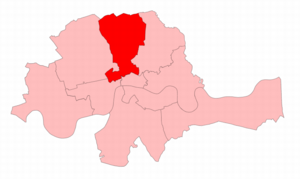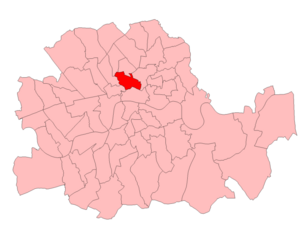Finsbury (UK Parliament constituency) facts for kids
Quick facts for kids {{{Name}}}[[{{{Type}}} constituency]] |
|
|---|---|
| [[Image:{{{Map1}}}Constituency.svg|120px|]] [[Image:England{{{Map2}}}.svg|120px|]] |
|
| {{{Name}}} shown within [[{{{Entity}}}]], and {{{Entity}}} shown within England | |
| Created: | {{{Year}}} |
| MP: | {{{MP}}} |
| Party: | {{{Party}}} |
| Type: | House of Commons |
| County: | [[{{{County}}}]] |
| EP constituency: | [[{{{EP}}} (European Parliament constituency)|{{{EP}}}]] |
Finsbury was an area in London that had its own special representative in the House of Commons. This is like a local area that gets to choose people to speak for them in the UK Parliament. Finsbury was a "parliamentary borough" twice: first from 1832 to 1885, and then again from 1918 to 1950.
When it was first created in 1832, Finsbury was one of seven new areas in London that could elect Members of Parliament (MPs). Before this, only Westminster and the City of London had this power. Finsbury was located just north of the City of London. It included several well-known places like Finsbury, Holborn, Moorfields, Clerkenwell, Islington, Stoke Newington, and a big part of what is now Camden Town.
Later, from 1918 to 1950, the Finsbury area that elected an MP was smaller. It matched the size of the Metropolitan Borough of Finsbury. This included Finsbury, Moorfields, Clerkenwell, and St Luke's, Islington. During this time, Finsbury only elected one MP. This change was part of a bigger goal to make sure each area had a fair say in Parliament.
Contents
History of Finsbury's Parliament Seats
Finsbury's First Parliament Role: 1832-1885
The Finsbury area got its first chance to elect MPs in 1832. This happened because of a big change called the Reform Act 1832. This law changed how parliamentary seats were given out across the country.
Originally, the plan was for Finsbury to cover a very large area, including some rural parts far from London. However, the people in charge of drawing the boundaries decided to make it smaller. They wanted to separate the "town" areas from the "country" areas. So, they drew the line through the northern part of Islington. Even with this change, the final area for Finsbury still included all of Islington.
The parliamentary area of Finsbury was officially described in a document called the Boundaries Act. It listed many parishes and places that were part of it, such as Saint Luke, Saint George the Martyr, Saint Giles in the Fields, Saint George Bloomsbury, Saint Mary Stoke Newington, and St. Mary, Islington. It also included places like Saffron Hill, Hatton Garden, and Lincoln's Inn.
By 1885, Finsbury had grown a lot in population. Because of this, another law, the Redistribution of Seats Act 1885, divided the area into seven new, smaller parts. Each of these new parts would elect only one MP. Four of these new areas became parts of a new area called Islington. The original Finsbury area was split into three new parts: Central Division, East Division, and Holborn Division.
Finsbury's Second Parliament Role: 1918-1950
In 1918, a new law called the Representation of the People Act 1918 created a new, single-member Finsbury parliamentary area. This new area was exactly the same as the Metropolitan Borough of Finsbury. This meant it was a specific local government area.
This second period for Finsbury as a parliamentary area lasted until 1950. At that point, it was combined with a nearby area called Shoreditch. Together, they formed a new parliamentary area known as Shoreditch and Finsbury.
Members of Parliament for Finsbury
This table shows the people who were elected to represent Finsbury in the UK Parliament.
MPs from 1832 to 1885 (Two Members)
| Election | 1st Member | 1st Party | 2nd Member | 2nd Party | ||
|---|---|---|---|---|---|---|
| 1832 | Robert Grant | Whig | Robert Spankie | Whig | ||
| 1834 by-election | Thomas Slingsby Duncombe | Radical | ||||
| 1835 | Thomas Wakley | Radical | ||||
| 1852 | Thomas Challis | Radical | ||||
| 1857 | William Cox | Whig | ||||
| 1859 | Liberal | Morton Peto | Liberal | |||
| 1861 by-election | William Cox | Liberal | ||||
| 1865 | William McCullagh Torrens | Liberal | Sir Andrew Lusk | Liberal | ||
| 1885 | constituency abolished: see Finsbury Central, Finsbury East and Holborn | |||||
MPs from 1918 to 1950 (One Member)
| Election | Member | Party | |
|---|---|---|---|
| 1918 | Martin Archer-Shee | Unionist | |
| 1923 | George Gillett | Labour | |
| 1931 | National Labour | ||
| 1935 | George Woods | Labour | |
| 1945 | John Platts-Mills | Labour | |
| 1948 | Labour Independent Group | ||
| 1950 | constituency abolished | ||
Images for kids
 | Claudette Colvin |
 | Myrlie Evers-Williams |
 | Alberta Odell Jones |





